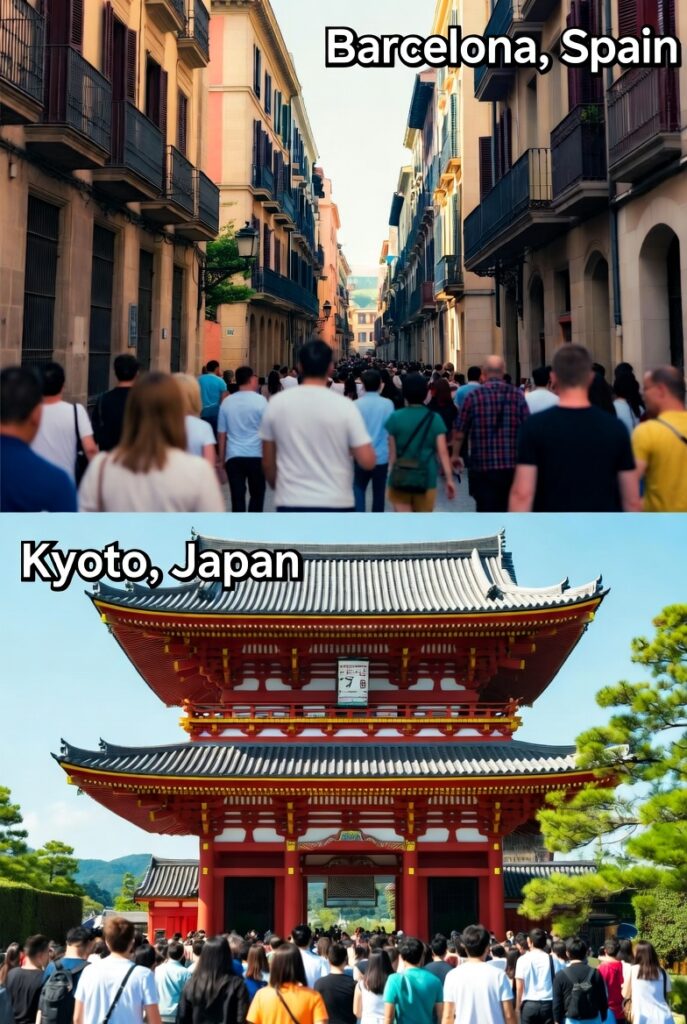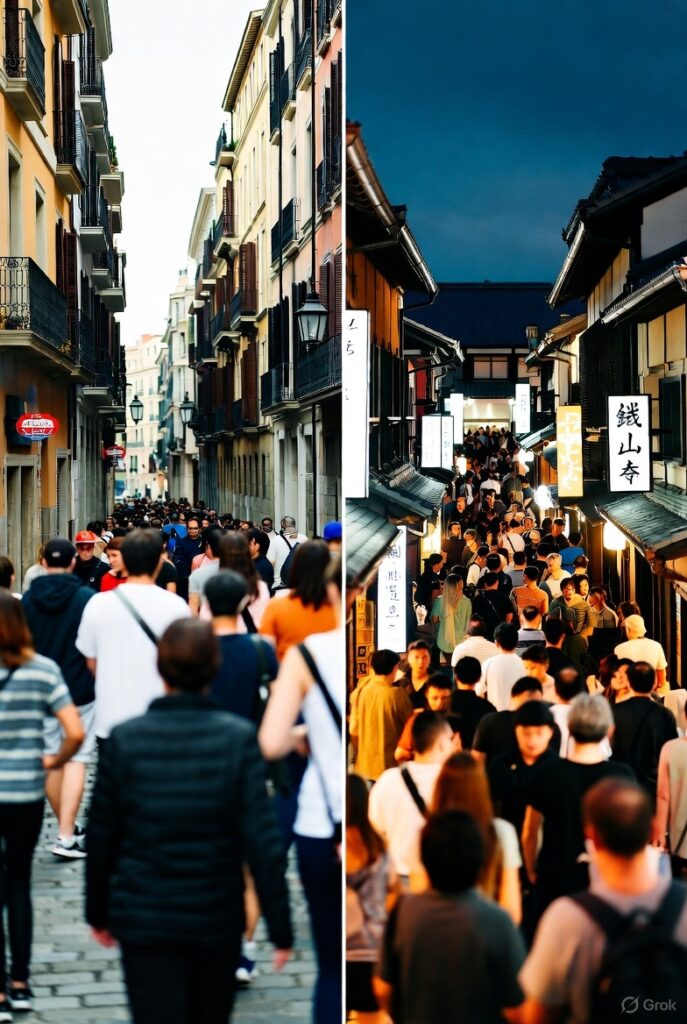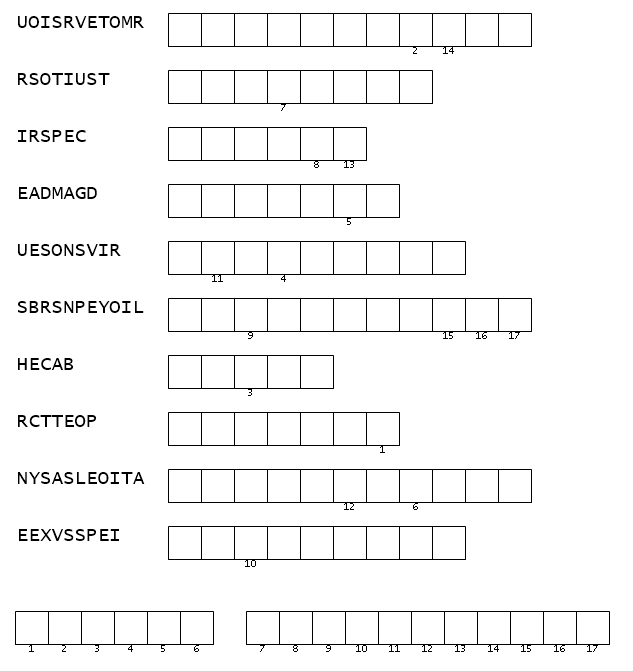- tourism’s biggest problem – be part of the solution?
Overtourism – A Problem We All Create
Today, many people travel to the same popular places. This is called overtourism, and it causes problems for nature, local people, and also for tourists themselves.
In cities like Venice, Barcelona, and Kyoto, there are too many visitors. Streets and monuments are full, and local people cannot live normally. In Thailand, Maya Bay was closed because tourists damaged the beach and coral.
Tourism also hurts nature. Planes, cars, and cruise ships make a lot of pollution. Many tourists leave trash on mountains and beaches, and hotels use too much water. This is bad for the environment.
Local people suffer too. Prices go up, and apartments become too expensive because owners rent to tourists. Traditional shops close, and only souvenir stores stay. The real local life and culture start to disappear.
The problem of seasonality makes it worse — in summer, some places are too full, and in winter, they are empty.
Tourists are part of this problem, but they can also be part of the solution. We can travel in the off-season, visit less famous places, respect local people, and protect nature.
If everyone travels responsibly, tourism can be good for locals, tourists, and the planet.
——————————
Vocabulary:
to create a problem / to cause a problem – to make something bad happen.
a monument – a big and important building or statue.
to damage – to break or hurt something.
coral – small colorful animals that live in the sea and make coral reefs.
to hurt nature – to make the planet dirty or weak.
pollution – dirty air, water, or land.
to leave trash – to throw away rubbish and not pick it up.
a mountain – a very high hill.
environment – the world around us: air, water, animals, and plants.
to suffer – to feel pain or to have a bad time.
prices go up – things become more expensive.
an owner – a person who has something (a house, a shop, etc.).
to rent – to pay money to use something for some time (a room, a car, etc.).
souvenir stores – shops that sell small gifts from a place.
to disappear – to go away or to stop existing.
seasonality – when something happens only in one part of the year.
to make something worse – to make a bad thing even more bad.
to be empty – when there are no people or things.
to be part of a problem – to also help make the problem happen.
a solution – a way to fix a problem.
off-season – the time of year when few tourists come.
less famous – not very well known.
to respect – to be kind and polite to people and places.
to protect nature – to keep animals, plants, and the planet safe.
to travel responsibly – to travel in a good way that does not hurt people or nature.
####################

Multiple choice:
- When tourists do something bad, they ______.
a) create a problem
b) clean the streets
c) open a restaurant - A monument is ______.
a) a city near water
b) an important building
c) a tall office block - If tourists walk on old stones, they can ______ them.
a) damage
b) paint
c) repair - Coral lives ______.
a) in the sea
b) on a tree
c) in the air - When people throw rubbish in nature, they ______.
a) watch birds
b) hurt nature
c) buy tickets - Cars and planes make ______.
a) pollution
b) flowers
c) music - It is bad to ______ after a picnic.
a) leave trash
b) wash dishes
c) close the bag - A mountain is ______.
a) a high hill
b) a deep lake
c) a long road - The environment means ______.
a) the people we meet
b) the world around us
c) the food we eat - Local people ______ when life is too expensive.
a) relax
b) suffer
c) travel - When prices go up, it means ______.
a) money is free
b) people pay less
c) things cost more - An owner is ______.
a) a person who has something
b) a person who sells fruit
c) a person who drives cars - Tourists sometimes ______ an apartment for a week.
a) paint
b) rent
c) sell - Souvenir stores sell ______.
a) local gifts
b) school books
c) fresh food - Old traditions can ______ when too many tourists come.
a) continue
b) improve
c) disappear - Seasonality means tourism happens ______.
a) in every month
b) in one part of the year
c) in every country - Loud tourists can ______ the situation _______
a) make____funny
b) make____worse
c) make____easy - In winter, some hotels are ______.
a) noisy with music
b) full of guests
c) empty of people - When many tourists come, we are all ______.
a) ready to help
b) free to relax
c) part of a problem - A solution is ______.
a) a place to buy food
b) a way to fix a problem
c) a new type of shop - The off-season is when ______.
a) buses are full
b) fewer tourists visit
c) hotels are cheapest - A less famous place is ______.
a) very well known
b) not very well known
c) new and modern - To respect local people means ______.
a) to walk very fast
b) to be kind and polite
c) to talk very loudly - We should protect nature by ______.
a) leaving trash behind
b) driving less often
c) keeping it clean - To travel responsibly means ______.
a) to travel in a good way
b) to visit big cities
c) to travel very fast
—————————
Answers:
1a, 2b, 3a, 4a, 5b, 6a, 7a, 8a, 9b,
10b, 11c, 12a, 13b, 14a, 15c, 16b, 17b,
18c, 19c, 20b, 21c, 22b, 23b, 24c, 25a
___________________________
Correct version:
- When tourists do something bad, they create a problem.
- A monument is an important building.
- If tourists walk on old stones, they can damage them.
- Coral lives in the sea.
- When people throw rubbish in nature, they hurt nature.
- Cars and planes make pollution.
- It is bad to leave trash after a picnic.
- A mountain is a high hill.
- The environment means the world around us.
- Local people travel when life is too expensive.
- When prices go up, it means people pay less.
- An owner is a person who has something.
- Tourists sometimes rent an apartment for a week.
- Souvenir stores sell local gifts.
- Old traditions can disappear when too many tourists come.
- Seasonality means tourism happens in one part of the year.
- Loud tourists can make it worse the situation.
- In winter, some hotels are empty of people.
- When many tourists come, we are all part of a problem.
- A solution is a way to fix a problem.
- The off-season is when hotels are cheapest.
- A less famous place is not very well known.
- To respect local people means to be kind and polite.
- We should protect nature by keeping it clean.
- To travel responsibly means to travel very fast.
#################
Match the Word to the Definition
Words:
- monument
- pollution
- to rent
- coral
- souvenir stores
- seasonality
- to damage
- off-season
- to respect
- environment
- to hurt nature
- prices go up
- to disappear
- a solution
Definitions:
A. A way to fix a problem
B. Small colorful animals that live in the sea
C. When tourism happens only in part of the year
D. Shops that sell small gifts from a place
E. To pay money to use something for some time
F. The world around us: air, water, animals, and plants
G. To be kind and polite to people and places
H. A big and important building or statue
I. Dirty air, water, or land
J. When things become more expensive
K. To break or hurt something
L. When something goes away or stops existing
M. The time of year when few tourists come
N. To make the planet or nature weak or damaged
_____________________
Answers:
1H, 2I, 3E, 4B, 5D, 6C, 7K,
8M, 9G, 10F, 11N, 12J, 13L, 14A
_____________________
Correct version:
- Too many tourists can make streets, beaches, and monuments very full.
- Overtourism does not make life more expensive for local people.
- Airplanes, cars, and cruise ships cause pollution.
- Maya Bay beach in Thailand was closed because tourists damaged nature.
- Local shops never change because of tourists.
- Long lines and crowded photos can make tourists’ experiences stressful.
- Using too much water in hotels is a problem in some places.
- Visiting less famous places can help reduce overtourism.
- Tourism can never hurt the environment.
- Seasonality means people travel at the same time every year.
- Tourists should always put their trash in bins.
- Learning a few words in the local language is a way to respect locals.
- Traveling only in the high season is better for local people.
- Historic sites can get damaged if too many people visit.
______________________
True: 1,3,4,6,7,8,10,14
______________________
Correct version:
- Too many tourists can make streets, beaches, and monuments very full.
- Overtourism does not make life more expensive for local people. True is: Overtourism makes life more expensive for local people.
- Airplanes, cars, and cruise ships cause pollution.
- Maya Bay beach in Thailand was closed because tourists damaged nature.
- Local shops never change because of tourists. True is: Local shops can change because of tourists.
- Long lines and crowded photos can make tourists’ experiences stressful.
- Using too much water in hotels is a problem in some places.
- Visiting less famous places can help reduce overtourism.
- Tourism can never hurt the environment. True is: Tourism can hurt the environment.
- Seasonality means people travel at the same time every year.
- Tourists should always put their trash in bins. True is: Tourists should always put their trash in bins to protect the environment.
- Learning a few words in the local language is a way to respect locals. True is: Learning a few words in the local language is a way to respect locals and local culture.
- Traveling only in the high season is better for local people. True is: Traveling in the off-season is better for local people and the environment.
- Historic sites can get damaged if too many people visit.
###################

Complete, fill in, words below:
hurt – environment – responsibly – expensive –
popular – everyone – beaches –
crowded – called –
sites – respect
————————————–
Today, many tourists go to the same __________ places.
This is __________ overtourism.
It causes problems for the __________, local people, and tourists.
Famous cities and __________ are too full.
Historic __________ can get damaged.
Local life becomes __________ and shops change for tourists.
Pollution, too much trash, and water use __________ nature.
Seasonality is another problem: places are very __________ in some months and empty in others.
The solution is to travel __________: visit less famous places, travel in the off-season, __________ local people, protect nature, and support the local economy.
This helps __________.
________________________
Full version:
Today, many tourists go to the same popular places. This is called overtourism. It causes problems for the environment, local people, and tourists. Famous cities and beaches are too full. Historic sites can get damaged. Local life becomes expensive, and shops change for tourists. Pollution, too much trash, and water use hurt nature. Seasonality is another problem: places are very crowded in some months and empty in others. The solution is to travel responsibly: visit less famous places, travel in the off-season, respect local people, protect nature, and support the local economy. This helps everyone.
###################
Unscramble words, all in text, find the phrase we are looking for:
